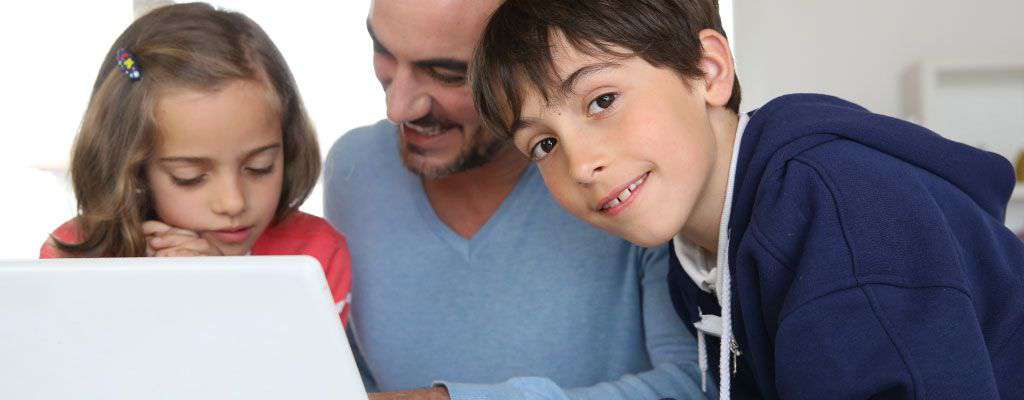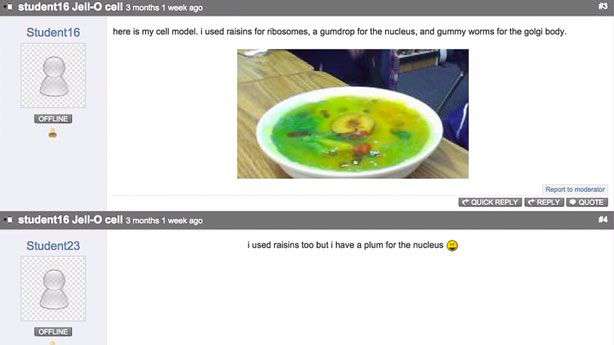Project ESCOLAR
Project ESCOLAR aims to improve science learning for your child. This project is designed to help all students learn, and may be especially helpful for students with learning disabilities.
Watch this short video to learn more about this project.
Your child is completing a collaborative online learng (COL) unit in one of these subject areas:
Life Science
Earth Science
Physical Science
Foundational Skills
These are called Collaborative Online Learning (COL) units because they help students do projects together to learn science. Students use technology tools to learn in different ways—with games, videos, text, interactive features, and computer simulations.
As they go through each COL unit, students use an online forum to discuss what they are learning with other students, in their own classrooms and in classrooms at other schools. Students also keep online notebooks to record what they do in their lessons.
Student Outcomes
Project ESCOLAR’s Collaborative Online Learning (COL) units take advantage of project-based learning principles to engage students in science. In their classrooms, students collaborate on the forum with other students in their own and other classes, watch videos and play games that teach science content, and check their understanding through interactive formative and summative evaluations.
Potential benefits for students who study with the COL units include:
Free access to online science resources within structured lesson plans.
Science learning gains (previously documented in studies with 5th- to 8th-grade students, including students with learning disabilities and English learners).
Improved proficiency in academic reading.
More positive attitudes towards science.
Opportunities, with an online forum, to collaborate with others in their class and in other schools. Students can post their own work and discuss science concepts.
How to Help Your Child Succeed
When parents/guardians are part of their child’s education, that child has a better chance of succeeding in school. You can help your child succeed in Project ESCOLAR by taking an active part in his/her learning.
Here are some ways to help your child learn science in this project:
Ask your child what part of the unit s/he is studying so that you know what s/he is learning and how s/he is progressing.
With your child or by yourself, review the part of the project website your child studied that day. Access to the website is easy (follow the steps below).
Look over your child’s notebook (see below) to check whether s/he has completed all the activities at each stage. Helping with the notebook is an especially good way to be involved.
Ask your child if s/he has completed the forum activity (see below); if not, support him/her in doing so.
Relate what your child is learning to everyday life. For example, if your child is studying viruses, talk about ways s/he can stay healthy.
Watch your child’s progress on the website, and make sure s/he is keeping up with the rest of the class; if your child is behind, encourage him/her to catch up by doing activities on the website at home.
Accessing the Unit
Follow these steps to access units on the website:
- Click on the “Curriculum” tab, and choose the unit that your child is studying.
- Log in to the unit with the username and password the project has provided (if you need help, email This email address is being protected from spambots. You need JavaScript enabled to view it.).
- When the unit page opens, with a description of what the unit is about, choose from the menu—on the left side of the screen—which stage of the unit you want to explore. Each stage covers a different part of the unit. A check mark appears at the end of each stage when your child has completed all the activities.
Unit Features
Here are some features you can access on the student website:
When you click on a stage, a lesson map shows you what students learn in each lesson. You can also see how each stage is connected to the previous and upcoming stages.
Some words in the text are in boldface and underlined. When you move the cursor over these words, a definition, and sometimes a picture, pops up. These are scientific vocabulary words, or words that students may find difficult.
Different links throughout the website give you quick access to features on other websites, such as games and videos, that are helpful for student learning.
Notice that lessons on the website have different titles, depending on the type of activity. Different types of activities are:
Warm Ups
- Introduce students to new information by relating their own experiences to the content they will learn (for instance, students think about diseases they’ve had before learning about the immune system)
Content Lessons
- Read and Discover: Text that teaches about science (for instance, a description about the digestive system)
- Bring It to Life: A link to a lab or field activity (for example, an activity to place different organs within the human body)
- Check It Out: A link to a video or interactive activity (such as an animation about the building blocks of life)
Evaluation Lessons
- What Do You Say? Students express their own ideas about what they are learning (for example, writing and drawing in their notebooks about the process of diffusion)
- Now You Try! Students answer questions (such as calculating their body mass index from height and weight)
Student Notebook
As students do activities, they write notes, answer questions, and complete assignments in their digital notebooks.
Writing notes
- A little notebook icon appears at the end of each paragraph in the lesson text. When your child clicks on the icon, s/he can type notes about what s/he is learning. These notes are saved so that students can look at them later; you can also see your child’s notes by logging into your child’s account. The notes are shown at the bottom of each page.
Answering questions
- Students sometimes use their notebooks to answer questions about what they have learned.
Completing assignments
- At times, students record in their notebooks the activities they do in their lessons.
Student Forum
The online forum is a place where students can post their work, answer their teachers’ questions, and connect with other students. Students complete a forum activity at the end of each stage of the unit.
Forum activities help make science relevant to your child’s everyday life. For example, in the Let’s Help Our Environment unit, students think about how they can reduce the carbon footprint of their own communities, and make the planet healthier.
You can access the student forum, and read what your child and other students are saying about their science lessons.
Glossary
In each unit, a glossary gives students helpful definitions and pictures for selected words. These are either scientific vocabulary words or words that students find challenging.
Throughout the unit, glossary words within the text are blue and underlined; the definitions and pictures can be viewed by moving the cursor over the word.

